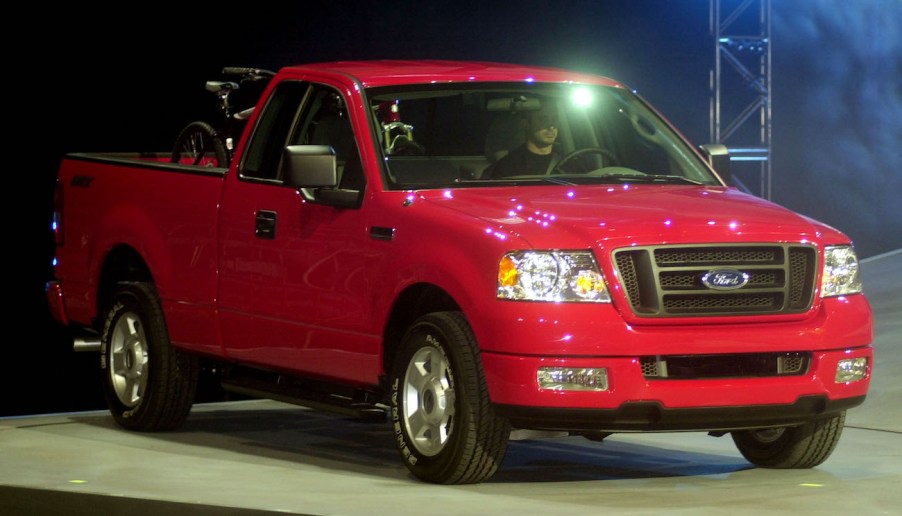
The Most Common 2004 Ford F-150 Problems
The 2004 Ford F-150 is a part of the iconic F-Series lineage of light-duty trucks, which Ford has manufactured and marketed since 1948. Positioned above the Ford Ranger, the F-Series is predominantly recognized for its full-sized pickup trucks, among which the F-150 stands out as the most sought-after variant.
The F-150 is now in its 14th generation, a testament to its 46-year enduring legacy that has been marked by myriad stylistic evolutions. The 2004 model corresponds to the eleventh generation, distinguished from its predecessor by several design alterations. However, despite the F-150’s overarching success, the 2004 version is not without its share of significant complaints from its owners on Car Complaints.
The windows of the 2004 F-150 don’t roll up
A prevalent issue plaguing many 2004 Ford F-150 owners revolves around the windows failing to roll up. On average, the malfunction seems to occur when the vehicle reaches approximately 67,000 miles and costs around $320 to fix. Car Complaints, a website that gathers vehicle grievances, received 615 grievances about this specific issue, rating its severity at 8.2 out of 10—categorizing it as “pretty bad.” The majority of these complaints indicate that the root of the problem lies in the window regulator, which often requires replacement. Interestingly, 16 reports note that owners have opted to replace their malfunctioning window regulators with those from models dating from 2006 and later.
Delving into individual complaints submitted to Car Complaints provides a deeper understanding of the owners’ frustration. There is a consensus among owners that the plastic components of the window mechanism become brittle with age, eventually leading to wear and breakage. Many express disappointment with the quality of the components, suggesting that more robust parts could have prevented the issue.
Some owners have taken matters into their own hands, procuring parts and fixing the windows themselves. Furthermore, there is a palpable sentiment of dissatisfaction with Ford’s response to these widespread complaints, with many asserting that the company hasn’t adequately addressed the concerns.
The 2004 Ford F-150’s engine knocks
The 2004 Ford F-150 has become a focal point for numerous owners due to a recurring engine-knocking issue. This problem, on average, manifests around the 86,350-mile mark and often entails a hefty repair bill averaging $1,430. Car Complaints has documented this problem as reported by 42 distinct 2004 F-150 owners. The severity of the engine knocking problem was assessed to be 7.3 out of 10, categorizing it as “pretty bad.”
Analyzing the submitted complaints on Car Complaints brings more clarity to the issue. Many owners lament Ford’s lack of accountability, highlighting the company’s long-standing ding issues with the 5.4 engine. The Intake Manifold Runner Control (IMRC) on the 4.2-liter V6, situated behind the intake manifold, is often associated with the knocking sound. Deteriorating plastic bushings, which anchor two rods to the intake manifold, have been identified as a potential cause of the engine noise.
Furthermore, several accounts describe an aggravating cam phaser problem specific to the 2004-2008 5.4L models. Symptoms start subtly but intensify over time, with the engine producing an alarming knocking sound, especially at lower rpm or while idling. Resolving the issue often involves specialized diagnostics and potential high-cost repairs.
The 2004 model’s engine also fails
Engine failure ranks as the third most prevalent complaint among owners of the 2004 Ford F-150. Typically manifesting at roughly 104,850 miles, this catastrophic issue can lead to repair costs nearing $5,800. The severity of this problem is underscored by its rating of 9.4 out of 10 on Car Complaints, denoting it as “really awful.” A vast majority of the 30 complaints recorded concluded that the only viable solution was a complete engine replacement.
This issue is not confined to just one model but spans various F-150 versions, including the F-150 XLT 5.1 liter, the F-150 V8, the F-150 XLT 5.4 liter 3V, the F-150 XL 4.6 liter, and the F-150 FX4 3.0 liter, among others.
Diving deeper into the complaints submitted to Car Complaints offers a vivid picture of owners’ distress. Common grievances depict engines stalling unexpectedly, even while in motion, posing severe safety risks. Despite routine maintenance and upkeep, engines have been reported to fail prematurely, with some ceasing to function just shy of 90,000 miles. Disheartened owners have also drawn comparisons between older, more durable Ford models and the 2004 F-150. Multiple reports emphasize the need for Ford to revisit their engine designs, hinting at a broader underlying issue in their engineering choices.


